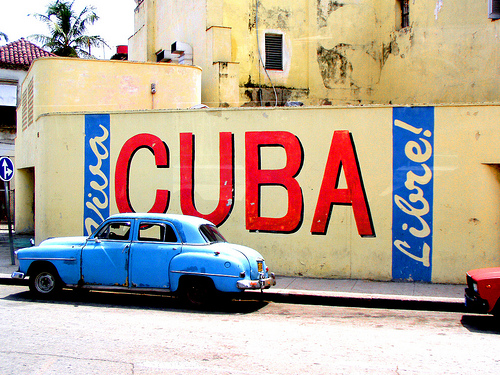By Caroline Iglesias, Staff Writer
As a 17 year old Cuban-American girl, I have grown up in an establishment highly influenced by the Cuban culture. From savoring a fresh-out-of-the-oven Pastelito de Guayaba (Cuban pastry filled with guava jelly) to endless nights of salsa dancing, there is no doubt I am of true Cuban descendant. However, the manner in which I came to be American-born is due to one cause: Fidel Castro’s dictatorship.
Fidel Castro came into power in 1959, promising his fellow Cuban supporters a democracy and an end to repression. Little did they know those promises would get thrown out the window as soon as he became President of Cuba. For the next 47 years, Cuba would remain under his power and become his very own socialist utopia.
Many Cubans that have crossed over to America have never returned home, due to their objection toward the Cuban government. As a result, many families have been eternally separated.
Through my family’s constant sharing of childhood stories, I concluded that they constantly psychologically relive their past. Unable to return to their origin, they voice their past acts as an outlet. It seems that by retrieving a memory, the emotion previously experienced in those memories comes to life.
If there is one quality my parents have made sure to ingrain in my head, it’s the ability to appreciate life’s blessings. I have grown up hearing, “We came from nothing and worked hard to give you something.” Any single complaint or remark that would exit my mouth as a child would be receive a lecture in response, beginning with, “ Listen honey, if you were in Cuba,” and ending with, “so be grateful.” In my opinion, appreciation is something many Cubans regard so highly because America granted them hope and a second chance. Many Cubans come to America, like my family, to study and work hard to make a life for themselves. Now, many of my family members are professionals, something otherwise impossible under Castro’s administration.
At the start of Castro’s revolution my grandfather was a wealthy young man. He came from a long line of doctors and architects. His family owned acres and acres of land, and as a child, he even had his own personal nanny to fan him on those hot, musty summer days in Cuba. When Castro rose to power, he forced my grandfather and his family to give up their land. My grandfather often recalls the instance in which his uncle refused to give up his land: in return, the government imprisoned him and forced him to stand on top of razor blade sharp Dole Pineapple cans—all while naked.
During the last decade or so, Castro lived a very private life. Not much was known of his whereabouts or his condition. For the longest time, many even said he had died; but, nothing confirmed that. This assumption was concluded false when Castro made an appearance during President Barack Obama’s diplomatic relations reestablishment in 2015.
November 25, 2016 became the day many Cubans awaited. I remember my parents chanting as I entered the door of the house. “ FIDEL CASTRO DEAD AT AGE 90,” the news station on the television reported. Ironically, his death occurred on the one day capitalism reaches its peak: Black Friday. I could not believe it. I was in awe. A man who was thought to be immortal at this point, was finally dead. They clapped pans together and waved the flag of their homeland. A sense of hope was finally a reality. The end to a long reign was finally here. Finally, the leader that my parents were born into, struggled under and even fled from was announced dead. The wealthy, beautiful Cuba that my parents heard their parents speak so proudly of, will finally be given a chance once again. It may take a while, but finally there is a sense of hope. Finally there is a sense of freedom.

